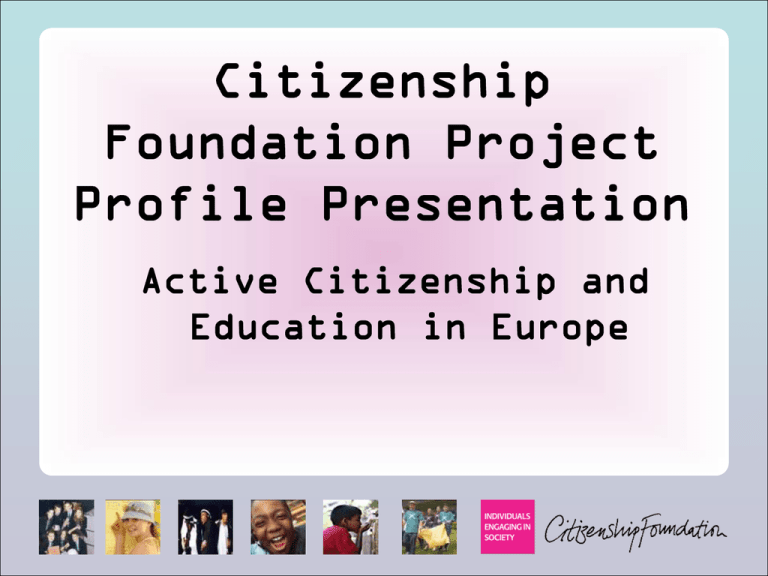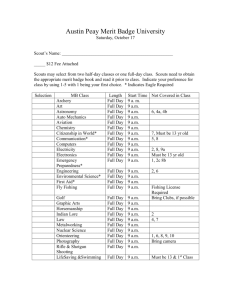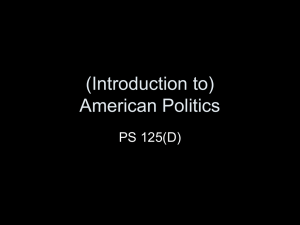ppt, 196 kb - DARE - Democracy and Human Rights Education in
advertisement

Citizenship Foundation Project Profile Presentation Active Citizenship and Education in Europe Active Citizenship and Education in Europe • Introduction to the Citizenship Foundation • Introduction to the projects • Project 1: Young Ideas for Europe • Project 2: Make the Link: Climate exChange • Conclusion – Connecting education for democratic citizenship and active citizenship Introduction to the Citizenship Foundation The organisation itself was established in 1989 as a result of the success of the Law in Education Project in 1984 funded by the Law Society- developed teaching materials to introduce students to their legal rights and responsibilities and the role of law in our democratic society Citizenship Foundation’s aim is to encourage and enable individuals to engage effectively in their communities and in democratic society at large. Now a small charity of approximately 30 employees offering a range of projects Introduction to the Projects The two projects presented today illustrate the Citizenship Foundation’s European links and how they have fostered the creation of these projects and enabled them to be delivered with partner organisations These projects both deal with linking schools in the UK with schools in other European countries and internationally The projects educate youth about democratic citizenship and allow for active engagement Project 1: Young Ideas for Europe Took place between June 2009-February 2010; Citizenship Foundation was approached by the European coordinator and German operational partner, IFOK to be the UK partner of the project Funded by Robert Bosch Stiftung The aim of the project was to get a UK school involved in the project and to link with a school in Germany and to increase their awareness of the EU by doing a set of role games and discussions on a topic This year’s topic was EU environmental policies 12 countries in total are involved, each with a school that links with a German school Project 1: Young Ideas for Europe 20-25 pupils aged 15-18 participate in the 4-day project week, accompanied by a teacher and facilitated by Citizenship Foundation staff The 2009-10 UK school was The Lammas School in London, linking with Gynmasium Hamm Europaschule in Hamburg The project takes place over 3 or 4 days aside from a preparatory day Day 1: Introduction to the EU and link to the topic of climate change Day 2: Learning about actions they can take. An expert on the topic delivered a workshop. The students are divided into different fictional political parties based on different doctrines and come up with policies Project 1: Young Ideas for Europe Day 3: The groups take part in a parliamentary-style debate based on their policies Throughout the project, the two linked schools meet on a dedicated website with their counterparts – post questions, comments, and discuss their ideas with each other Some ideas the students came up with: rewarding people for making the environment more friendly; strong rules and fines for non-compliance; ensuring that countries work together to tackle climate change The students actively learn and engage about the EU Students come up with policies and other ideas to tackle the issue, while linking with other European pupils Project 2: Make the Link: Climate exChange This 3 year EU-funded project is in its opening stages and will be launched in September 2010 Plan UK has partnered with Citizenship Foundation and Partners Bulgaria Foundation and other Plan offices to deliver this project in the UK, the Netherlands, Bulgaria, Senegal, Kenya and Malawi The aims of the project is to raise awareness about the link between climate change and poverty by empowering young people to take action and become change agents The key target of this project is young people aged 11-19 in the 6 participating countries –young people from 369 schools and youth groups Project 2: Make the Link: Climate exChange The resources will have 7 units available in each language that will be accompanied by an online platform where students can log in and link with other young people from any of the other participating countries to discuss climate change Citizenship Foundation will deliver the active citizenship component through a training manual, by training the trainers in each of the 6 countries who will deliver residential training and by delivering the UK residentials on advocacy campaigning skills An estimated 40% of the schools will apply for 100 Euro grants to continue in the next phase of the project to build a local campaign Project 2: Make the Link: Climate exChange A further 15% will be selected to take part in Active Citizenship Residential training and will receive 300 Euro grants to take their campaign nationally and EU-level This project was designed to provide young people the knowledge and skills to become active citizens The participants will be directly involved in the action process that will promote positive models for activism, and a range of options for youth-led action by engaging young people in the real issues that affect their schools and communities Connecting education for democratic citizenship and active citizenship These projects foster education for democratic citizenship by: • Supporting young people to understand the many facets of being a citizen – the Council of Europe asserts that “the active participation of young people in decisions and actions at local and regional level is essential if we are to build more democratic, inclusive and prosperous societies.” • Teaching the skill of democratic citizenship – not just about the institutions of government, but what it means to be part of society and how to be involved and play a part Connecting education for democratic citizenship and active citizenship The active citizenship components in the projects: • Give young people the tools to feel empowered and to act • Bridge the gap between high level policy and public engagement at local, national and international levels by counteracting youth disenfranchisement in policy areas and government by making young people feel that they have the power to act and make a difference





